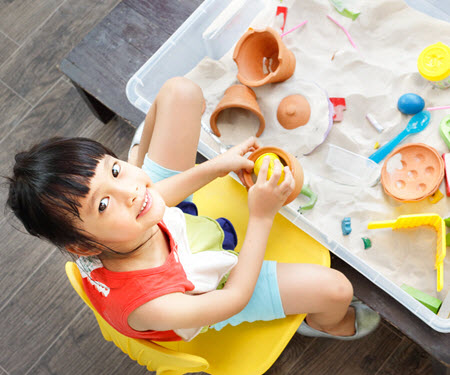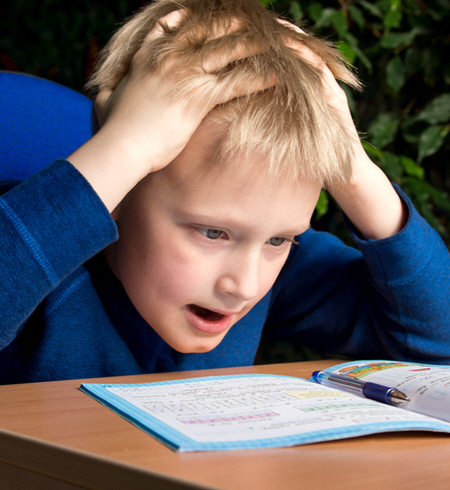 Have you ever seen a “play therapy” session?
Have you ever seen a “play therapy” session?
“Boom! Bang! Roar!” yells 8-year-old Tommy* as the sand goes flying and the dinosaurs violently crash into each other.
Tommy enthusiastically continues to explain the world he created in the sand tray with great gusto: “The big dinosaurs are fighting over the little dinosaur. The little dinosaur is scared and buried himself in the sand.”
Tommy continues this battle throughout the duration of his therapy session.
If you are like many parents, you are probably thinking, “Wait! Tommy is just using his imagination by playing and messing around in a sand box. This doesn’t look like therapy!”
To an untrained eye, Tommy looks as though he’s just being a kid and playing with dinosaurs. In reality, though, Tommy is playing out his parent’s tumultuous divorce.
Kids think and learn through their play.
Adults can analyze their feelings and engage in abstract thinking. Kids are still developing and growing these skills, so they process their emotions in a way that makes sense to them: through being creative and through their play.
Children do not process information the same as adults, so their therapy cannot look the same.
Kids will be engaged by being hands-on with the sand tray, paints, coloring, drawing pictures, creating crafts and games. This will allow your child to be comfortable while they talk about their life. As they are playing, we integrate therapeutic skills and direction, without it feeling heavy. We help them to process their emotions and feelings in the most natural way possible; by just being a kid.
 Children will emotionally express themselves…
Children will emotionally express themselves…
… the only way their brain is wired when they are overwhelmed: through an emotional meltdown.
These meltdowns can leave the kids feeling unloved and disconnected… and parents exasperated, worried, and confused.
The meltdowns can be moments of epic rage and anger that seem to come out of nowhere. One minute your child is fine, and the next, you are confused and wondering what in the world happened.
You are constantly receiving phone calls from the school that your kid hit another child or yelled at the teacher.
Each morning you are frazzled as they scream at the top of their lungs or battle with them trying to get your kid out of the car at carline, but they refuse to budge.
Your child can worry and have anxiety over the smallest thing that they then become fixated on, and you don’t know what to say to calm their irrational fears.
Or, there can be fights over doing homework that seem to never end. Your child’s focus is gone for the day, and you dread fighting the homework battle every night. You also go to bed hoping that they will behave in school tomorrow and that no more notes will be written in their planner.
Meltdowns don’t always look like anger.
Your once happy child now seems to mope around the house all the time and does not seem interested in doing the things they once loved doing. They complain that no one likes them or that no one wants to play with them. They want to eat all the time out of boredom, and their whining is on your last nerve. To get them motivated is like pulling teeth, and you feel like this stage of life will never end.
Meltdowns can be caused by life transitions, like a divorce.
When a child’s parents are going through a divorce, it is like the snow globe of their life is being shaken. Your child is unsettled, confused, and doesn’t always understand what is going on in their life, or who they will be with on any given day. Often, children feel the need to pick a parent to love more, and they feel pulled in opposites directions. Children do not want to choose a parent that they “love” more because they desire to love both parents equally.
It doesn’t matter what your child is dealing with, whether they are being bullied, having night terrors, or attempting to adjust to depression.
It is terrifying not knowing how to help your child or wondering what is wrong!
 No matter the issue, it can be addressed in therapy with your child.
No matter the issue, it can be addressed in therapy with your child.
Parental feelings of guilt and shame are very real, but they don’t have to be. There are other, healthier options to parenting than yelling at your kid and feeling like you are losing your mind.
Through therapy, your child will be taught tips and tricks to emotionally control themselves and how to appropriately respond to parental requests.
At Abba’s Heart Counseling, we will cater the therapeutic play time and craft time around activities that will allow your child to emotionally express themselves. They will learn tools and tricks on how to better handle anger outbursts, boost their self-esteem, and cope with anxiety and depression.
Through their play, drawings, and different engaging activities, they will be taught life skills on how to deal with bullying or better cope with a family transition, such as a divorce, re-marriage, or a new sibling.
Even kids who have attention deficit disorder or attachment issues will find therapy helpful, because it will help teach them self-control and healthy attachment and boundaries in an environment that is kid-friendly.
Whether your child is playing a game of paper basketball while answering emotionally based questions or is elbow deep in the sand tray, or has finger paint on all five fingers, your child’s therapy will be geared toward their interests and their needs.
There is a different way… a better way.
You can have a child that feels great himself or herself… and actively shows love toward their family and friends.
Help is available. You don’t have to struggle at this parenting thing alone.
“It takes a village to raise a kid,” and at Abba’s Heart Counseling Center, we can be your village.
Reach out today to start the healing process for both you and your child: (407) 285-6284

